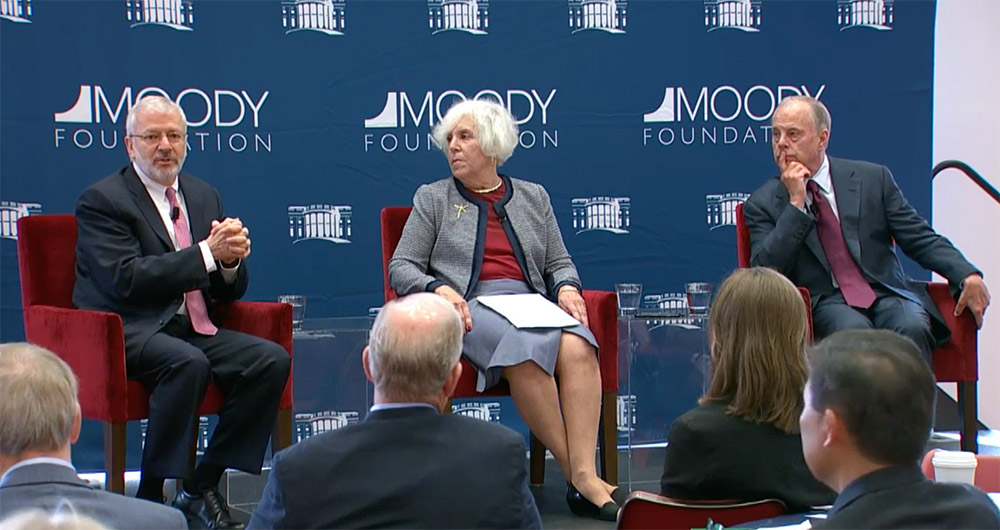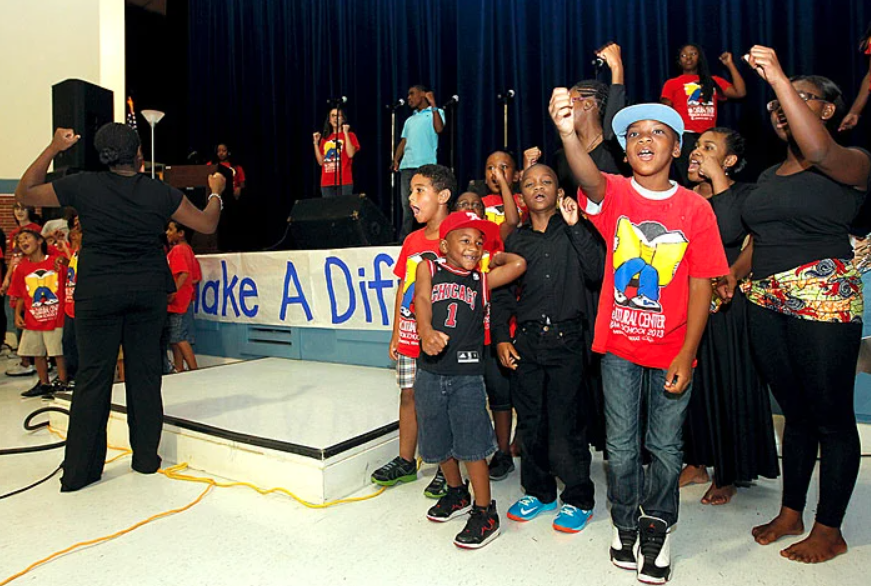
Moody Grant Recipient: White House Transition Project
Pictured: White House Chiefs of Staff Joshua Bolten (George W. Bush) and Thomas “Mack” McLarty (Bill Clinton) and White House Transition Project Director Martha Joynt Kumar.
Tell us more about the White House Transition Project.
Recognizing the crucial yet fragile nature of presidential transitions, presidency scholars in the late 1990s expressed interest in assisting incoming administrations by using the knowledge and tools developed by political scientists. This helps explore how a president can effectively move from campaigning to governing and from the president-elect being a representative of one party to becoming the leader of all of our citizens. The WHTP grew out of this commitment and continues to involve top presidency scholars who research and write about presidential transitions with a focus on assisting incoming staff to develop the effective and responsive White House operations needed for a good beginning for a president and his administration.
We base our information on interviews with scores of White House staff at the leadership level in the administrations of Presidents Obama, George W. Bush, Clinton, George H. W. Bush, Reagan, Carter, Ford and Nixon. These are the people who have run the most critical offices in the White House, including the Chief of Staff, National Security Advisor, Staff Secretary, White House Counsel and more. Using our interviews and related materials, we provide briefing books with information on the functions associated with the offices as well as the responsibilities of their directors, how they have been organized, what works and how to avoid serious mistakes. We also provide organization charts, original research and essays on critical questions such as presidential appointments, crisis management, press relations and normal presidential routines.
What has been the most memorable day (so far) in your work with the White House Transition Project?
For us our most memorable experiences happen every time we first meet a candidate’s transition planners to discuss the range of useful information we will provide them. The candidate eventually becomes the president-elect. For instance, at the conclusion of our first meeting with the planner for Governor George W. Bush, he thought the system they originally used to recruit and document around 15,000 personnel resumes would not be able to handle the 190,000 resumes they would eventually collect in their first 70 days in office. Over the years, we’ve received letters from staff and even past presidents, thanking us for helping them learn about their offices and jobs.
How has the community or your peers benefited from work funded by the Moody Foundation?
For White House staffs, they have learned their new responsibilities and jobs have a continuity with those from the past – they can learn from the past rather than assume their situation is completely unique based on their ideologies or experiences.
Former White House Chiefs of Staff have told us the WHTP has helped transform the Washington culture and the culture of campaigns. Candidates now feel comfortable creating planning operations to prepare them for what comes after winning. Consequently, when presidents do not use those plans, we know what happens and where the problems come from. Additionally, an area we know we have affected is the presidential appointments process. Initially, we documented the burdens on nominees the process placed on them. That led to reducing the redundant questions of nominees by 30 percent and resulted in the first-ever electronic application process using a model we pioneered. We have also helped identify appointments the Senate really doesn’t want to consent on. That led to legislation reducing the numbers of these less critical appointments – the total numbers the Senate has to process – by 20 percent. Senior staff for President Obama also asked WHTP to assist in developing plans to streamline the appointments process.
For our community, there is also a well-documented and positive economic effect on the GDP of Texas that is associated with a successful transfer of national democratic power. As citizens, we know we have helped with improving the economic circumstances in Texas.
What are you using the funds for?
Our Moody Leadership Series sponsored two- and three-day public conferences each focused on a specific transition issue, including crisis management and national security, held at the George W. Bush, Lyndon Johnson and George H.W. Bush Presidential Libraries. The conferences brought together former White House Chiefs of Staff and national security advisors, other staff, and academic experts to discuss these sorts of early preparations.
The Moody Foundation’s support from its board of trustees, Frances Moody-Dahlberg, Ross Moody and Elizabeth Moody, also directly improved our briefing materials by expanding our base of interviews with former White House staff, including new interviews with Obama and George W. Bush staff. Those interviews boosted the performance of numerous Assistants to the President in learning what to expect and what to avoid in their work. It lowered the costs of their “on-the-job training” especially when these staff have so little time between appointment and when they officially take on their responsibilities.
We know they recognize the effectiveness of the WHTP because when they are promoted to greater government responsibilities – which happens often when moving to another White House job – they come back looking for our materials to help them shorten the time necessary to learn their new responsibilities.
How do you hope the White House Transition Project and its programs will grow in the next several years?
We currently brief 12 offices in the White House that cover three kinds of functions: those that handle process (ex: Chief of Staff), those that handle outside relationships (ex: Press Secretary), and those that handle policy (ex: National Security Council). We want to expand and fully develop our briefing materials to add other offices in each of these functions. We also want to identify and clarify those processes critical to the preparations for a transition, such as crisis management, agenda preparation, appointments and communications. Fully understanding these issues helps the new staff prepare for what is genuinely unique about the White House.




